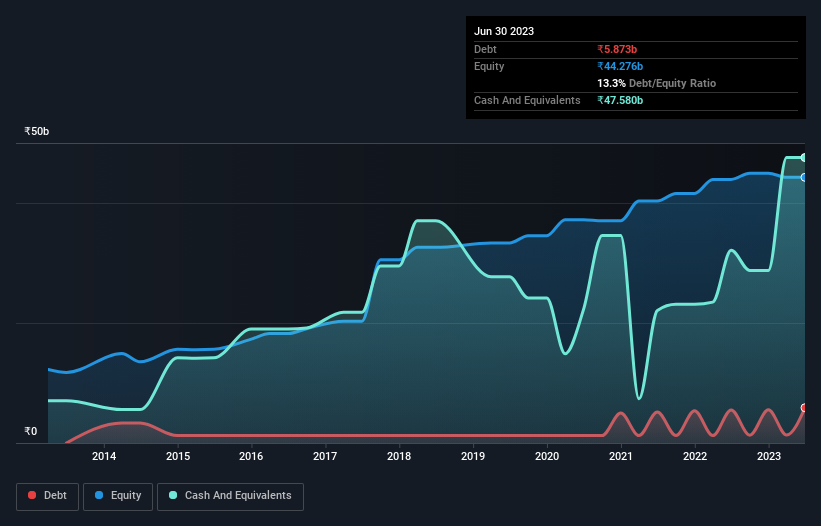We Think Cochin Shipyard (NSE:COCHINSHIP) Can Stay On Top Of Its Debt

David Iben put it well when he said, 'Volatility is not a risk we care about. What we care about is avoiding the permanent loss of capital.' When we think about how risky a company is, we always like to look at its use of debt, since debt overload can lead to ruin. We note that Cochin Shipyard Limited (NSE:COCHINSHIP) does have debt on its balance sheet. But the real question is whether this debt is making the company risky.
When Is Debt A Problem?
Debt assists a business until the business has trouble paying it off, either with new capital or with free cash flow. Ultimately, if the company can't fulfill its legal obligations to repay debt, shareholders could walk away with nothing. However, a more usual (but still expensive) situation is where a company must dilute shareholders at a cheap share price simply to get debt under control. Of course, debt can be an important tool in businesses, particularly capital heavy businesses. When we think about a company's use of debt, we first look at cash and debt together.
See our latest analysis for Cochin Shipyard
What Is Cochin Shipyard's Net Debt?
As you can see below, at the end of March 2023, Cochin Shipyard had ₹5.87b of debt, up from ₹5.51b a year ago. Click the image for more detail. However, it does have ₹47.6b in cash offsetting this, leading to net cash of ₹41.7b.

How Healthy Is Cochin Shipyard's Balance Sheet?
We can see from the most recent balance sheet that Cochin Shipyard had liabilities of ₹51.2b falling due within a year, and liabilities of ₹4.72b due beyond that. On the other hand, it had cash of ₹47.6b and ₹4.11b worth of receivables due within a year. So its liabilities total ₹4.24b more than the combination of its cash and short-term receivables.
Since publicly traded Cochin Shipyard shares are worth a total of ₹125.6b, it seems unlikely that this level of liabilities would be a major threat. Having said that, it's clear that we should continue to monitor its balance sheet, lest it change for the worse. While it does have liabilities worth noting, Cochin Shipyard also has more cash than debt, so we're pretty confident it can manage its debt safely.
The modesty of its debt load may become crucial for Cochin Shipyard if management cannot prevent a repeat of the 58% cut to EBIT over the last year. When it comes to paying off debt, falling earnings are no more useful than sugary sodas are for your health. When analysing debt levels, the balance sheet is the obvious place to start. But ultimately the future profitability of the business will decide if Cochin Shipyard can strengthen its balance sheet over time. So if you want to see what the professionals think, you might find this free report on analyst profit forecasts to be interesting.
Finally, a company can only pay off debt with cold hard cash, not accounting profits. Cochin Shipyard may have net cash on the balance sheet, but it is still interesting to look at how well the business converts its earnings before interest and tax (EBIT) to free cash flow, because that will influence both its need for, and its capacity to manage debt. Happily for any shareholders, Cochin Shipyard actually produced more free cash flow than EBIT over the last three years. That sort of strong cash generation warms our hearts like a puppy in a bumblebee suit.
Summing Up
We could understand if investors are concerned about Cochin Shipyard's liabilities, but we can be reassured by the fact it has has net cash of ₹41.7b. The cherry on top was that in converted 151% of that EBIT to free cash flow, bringing in ₹16b. So we don't have any problem with Cochin Shipyard's use of debt. The balance sheet is clearly the area to focus on when you are analysing debt. However, not all investment risk resides within the balance sheet - far from it. Be aware that Cochin Shipyard is showing 2 warning signs in our investment analysis , you should know about...
When all is said and done, sometimes its easier to focus on companies that don't even need debt. Readers can access a list of growth stocks with zero net debt 100% free, right now.
New: AI Stock Screener & Alerts
Our new AI Stock Screener scans the market every day to uncover opportunities.
• Dividend Powerhouses (3%+ Yield)
• Undervalued Small Caps with Insider Buying
• High growth Tech and AI Companies
Or build your own from over 50 metrics.
Have feedback on this article? Concerned about the content? Get in touch with us directly. Alternatively, email editorial-team (at) simplywallst.com.
This article by Simply Wall St is general in nature. We provide commentary based on historical data and analyst forecasts only using an unbiased methodology and our articles are not intended to be financial advice. It does not constitute a recommendation to buy or sell any stock, and does not take account of your objectives, or your financial situation. We aim to bring you long-term focused analysis driven by fundamental data. Note that our analysis may not factor in the latest price-sensitive company announcements or qualitative material. Simply Wall St has no position in any stocks mentioned.
About NSEI:COCHINSHIP
Cochin Shipyard
Engages in the shipbuilding and repair of ships/offshore structures in India.
Solid track record with adequate balance sheet.
Similar Companies
Market Insights
Community Narratives



